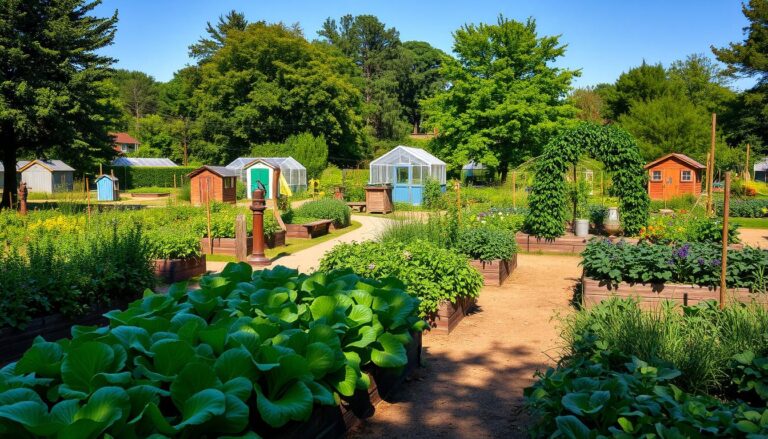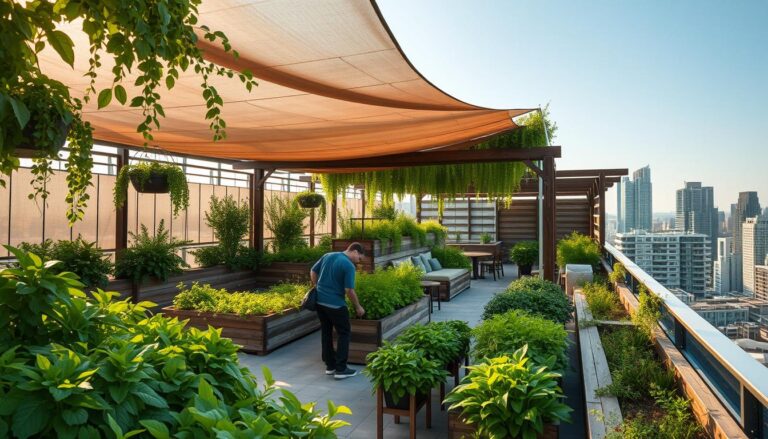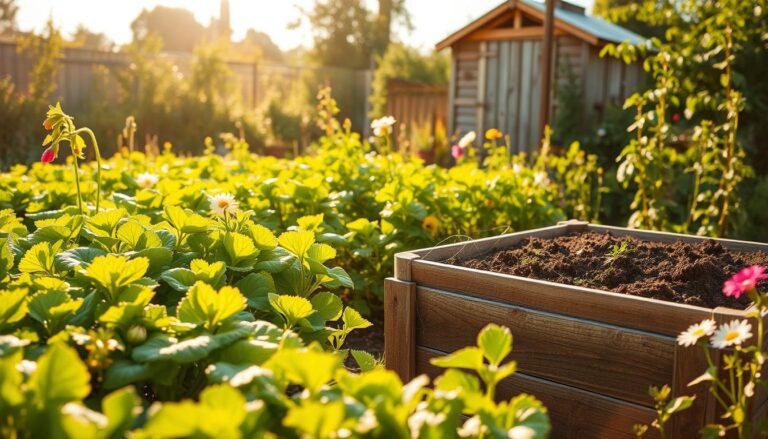Using eco-friendly garden tools and sustainable methods is good for the planet. It also makes your plants healthier and more beautiful.
Starting your organic gardening journey means using natural and sustainable products. This is key.
Choosing sustainable gardening products helps the planet. It also makes your garden a better place for all living things.
This way of gardening is more than a trend. It’s a way to help the environment and enjoy the results of your hard work.
The Benefits of Choosing Organic Gardening Methods
Organic gardening offers many benefits, from saving the environment to improving our health. It helps us reduce our impact on the planet. At the same time, it makes our gardens healthier and more sustainable.
Environmental Impact of Organic Practices
Organic gardening is great for the environment. It avoids harmful chemicals, keeping our soil, air, and water clean. Using environmentally friendly garden supplies is key to keeping nature in balance.
Choosing natural fertilizers helps our soil without harming good microbes.
Health Advantages for Gardeners and Consumers
Organic gardening is good for both our planet and our health. It lets us grow food without harmful chemicals. This means we get to eat healthier fruits and veggies.
Gardening also keeps us active, which is good for our health. Using green gardening solutions makes gardening safer and healthier for us.
Long-term Soil Health and Biodiversity
Organic gardening is also good for our soil and biodiversity. Practices like crop rotation and composting improve soil health. They help our plants grow strong and healthy.
This leads to better yields and a more resilient garden. Gardeners enjoy a more diverse and thriving garden ecosystem.
Essential Organic Gardening Supplies for Success
Choosing the right organic gardening supplies is key to a sustainable garden. You need the best tools, containers, and materials that follow organic gardening rules.
Eco-Friendly Garden Tools and Equipment
Tools made from sustainable materials help the environment and make gardening better. Eco-friendly garden tools are strong and work well, making your gardening tasks easier.
Hand Tools Made from Sustainable Materials
Hand tools from bamboo or recycled metals are durable and green. They’re not only good for the planet but also add beauty to your garden.
Solar-Powered Garden Accessories
Solar-powered garden accessories like lights and irrigation controllers use the sun’s power. They’re a smart choice for a greener, cheaper garden.
Sustainable Containers and Growing Systems
The containers and systems you choose affect your plants and the environment. Sustainable containers like terracotta, recycled plastic, or wood are better. They’re good for the planet because they can be reused or broken down.
Organic Seeds and Heritage Varieties
Starting with organic seeds and heritage varieties is crucial. These seeds are grown without harmful chemicals. They help your garden grow healthy and keep biodiversity alive.
Organic Soil Amendments and Natural Fertilizers
To care for your plants naturally, enriching your soil is key. Use the right organic amendments and fertilizers. Organic gardening aims to create a balanced ecosystem. It supports healthy plant growth without synthetic chemicals.
Compost and Composting Systems
Composting is essential in organic gardening. It turns waste into a valuable resource. This process creates a nutrient-rich soil amendment.
It improves soil structure and boosts microbial activity. This supports healthy plant development.
Backyard Compost Bins and Tumblers
Backyard compost bins and tumblers help manage organic waste. They produce high-quality compost. These systems vary in design, from simple bins to rotating tumblers.
This makes it easy to find one that fits your space and needs.
Worm Composting for Small Spaces
Worm composting, or vermicomposting, is great for small spaces. It uses red wiggler worms to break down organic matter. This creates a nutrient-dense compost.
It’s perfect for indoor or small outdoor spaces.
Plant-Based and Animal-Based Fertilizers
Organic gardeners use various fertilizers. These include fish emulsion, bone meal, and alfalfa meal. Each provides different nutrients.
They support plant health and soil fertility.
Organic Mulches for Moisture Retention
Organic mulches are crucial for soil moisture. They suppress weeds and regulate soil temperature. Materials like straw, bark chips, and leaves create a protective layer.
| Organic Amendment | Nutrient Content | Benefits |
|---|---|---|
| Compost | Balanced NPK, Microorganisms | Improves soil structure, fertility, and microbial activity |
| Fish Emulsion | High in Nitrogen, Phosphorus | Promotes leafy growth, enhances soil fertility |
| Bone Meal | High in Phosphorus, Nitrogen | Encourages root development, flowering, and fruiting |
Non-Toxic Pest Control and Plant Protection
Keeping your garden healthy is more than just caring for your plants. It also means protecting them from pests without harming the environment. Organic gardening focuses on using safe pest control methods. This ensures a green and sustainable way to garden.
Biological Pest Control Products
Biological pest control uses living things or products made from them to fight pests. Beneficial insects like ladybugs and lacewings eat common garden pests. Bacillus thuringiensis (Bt) products also work well against some pests. These methods are safe for the planet, people, and pets.
- Ladybugs and lacewings for aphid control
- Bt products for caterpillar management
- Nematodes for soil pest control
Physical Barriers and Traps
Physical barriers and traps are great for pest control. Row covers keep insects away from your plants. Copper tape stops slugs and snails. Traps like sticky traps or pitfall traps catch and remove pests.
Companion Planting Strategies
Companion planting is a traditional way to grow plants together. It helps them grow better or keeps pests away. For instance, marigolds fight nematodes, and basil keeps aphids and other pests off. This method also makes your garden more diverse.
- Plant marigolds with tomatoes to deter nematodes
- Use basil to protect against aphids
- Grow nasturtiums to repel aphids, whiteflies, and other pests
Conclusion: Building Your Sustainable Garden with Organic Gardening Supplies
Choosing organic gardening supplies is a big step towards a sustainable garden. It’s good for you and the planet. Organic gardening reduces harm to the environment, improves health, and keeps soil healthy.
Using eco-friendly tools and organic soil amendments makes gardening better. Non-toxic pest control and planting plants together are green solutions. They protect your plants and the environment.
When building your sustainable garden, pick organic supplies from trusted sources. This boosts your garden’s health and biodiversity. It also helps the gardening community be greener. Making smart choices in gardening leads to a lasting, healthy garden.
FAQ
What are the benefits of using organic gardening supplies?
How do I choose the right eco-friendly garden tools?
What is the best way to compost at home?
Are organic seeds worth the investment?
How can I control pests in my garden without using chemicals?
What are some effective natural fertilizers for my garden?
Can I use organic gardening supplies in containers?

Sortemdia nasceu com o propósito de trazer alegria e oportunidades para todos por meio de sorteios gratuitos de prêmios incríveis. O site tem como missão oferecer experiências acessíveis, divertidas e justas para quem deseja concorrer a produtos, serviços e brindes sem pagar nada por isso. Acreditamos que a sorte pode bater à porta de qualquer pessoa — e no Sortemdia, ela pode chegar com apenas um clique.



